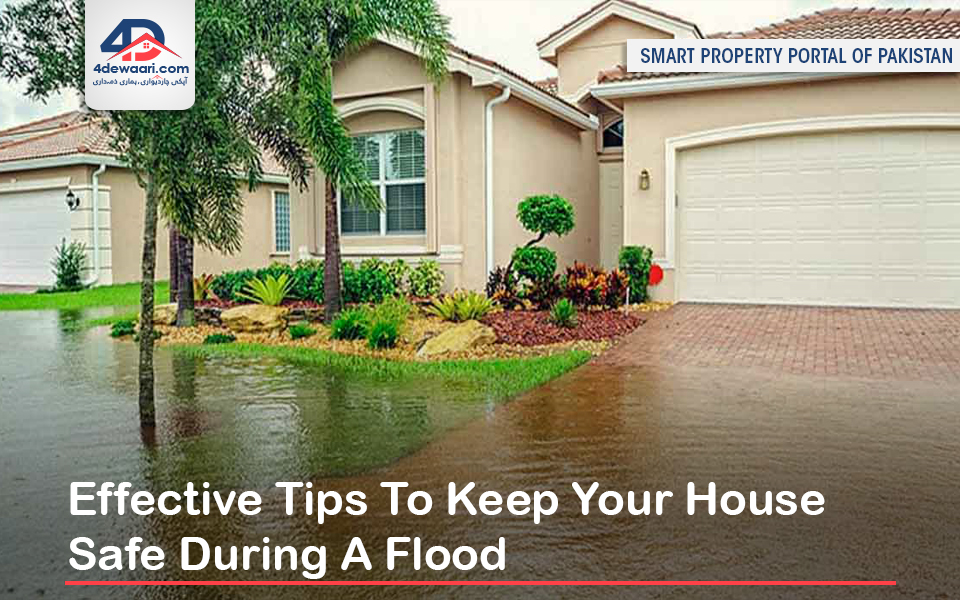Having your home flood can be an overwhelming experience, and keeping it safe during flooding isn't easy either. There are many different ways that your home can flood, from a simple broken pipe to sudden flash flooding caused by torrential rain or even a hurricane. To help you deal with the aftermath of this type of disaster, we've put together some tips on how to keep your house safe during a flood so you can save your property and your loved ones from the damage of flood in the future. Here are some flash Effective Tips for flood safety, Let's get started!
Best Effective Measures for Flood Safety
Elevate House on Stilts
One of the best ways to stop floods is to elevate your house on stilts. The stilts raise the house above the floodwaters, keeping it dry and safe. Plus, if the waters rise high enough to reach the stilts, they will act as a barrier, preventing the water from entering your home. It's best to find a good spot for them before severe weather hits to ensure that you have the correct height. Ensure they are secure and won't be easily knocked over by heavy winds or waves. You'll also need to ensure that there's enough space around the perimeter of your property for these supports to go up without getting in the way. If not, consult an engineer about how many support posts would be needed.
Read Also
Best Tips to Keep Houses Dengue Free
Use polyurethane or epoxy sealant on gaps
These types of sealants can be used to fill any gaps or cracks that might exist in your home's foundation. It will help to create a water-resistant barrier that can prevent floodwaters from seeping into your home. Use epoxy if you have any pipe leaks, as polyurethane may not adhere well enough. It would help if you also do this for the perimeter of your basement, which is often susceptible to floods due to outside water pressure.
Apply caulk
Sealing off your kitchen and bathroom pipes with caulk is another flood prevention method. Water flows through these areas more quickly than other parts of your house, so it's essential to take extra precautions here.
Replace all gaskets with non-porous silicone
It is also the best tip for flash flood safety is to replace all of your home's gaskets with non-porous silicone. Silicone is a waterproof material that will create a barrier between your home and any water that tries to enter. Be sure to replace all the gaskets in your home, including those around doors and windows, to help keep flood waters out.
Seal openings with steel wool
Sealing any openings in your home that could allow water in during a flood is vital. Steel wool is an effective way to do this, as it can't be chewed through by animals and is too dense for water to penetrate. Stuff steel wool into any cracks or crevices around your home, and you'll be one step closer to flood-proofing your property. For added protection, use metal sheeting (or the screen off of a window) to create additional barriers over openings where the steel wool doesn't fit.
Install a sump pump or foundation vents
One of the flood prevention measures for homes is a sump pump. It is a pump put in the lowest point of your house and removes water accumulated in the crawl space or basement. It helps keep air circulating so that moisture doesn't get trapped inside.
Install filters in sewer drains
A clogged sewer drain can quickly lead to flooding in your home. To prevent this, be sure to install filters in all of your sewer drains. It will help catch debris that could clog the drain and cause flooding. Plus, it will help keep any sewage from backing into your home.
Install check valves on your pipes
Check valves restrict the direction of water flow so that it cannot enter your home through the drainage system. They're easy to install and are relatively inexpensive, making them a great way to keep your home safe from flooding.
Read Also
Best House Insulation Tips For Winters
closed-cell foam spray insulation
Closed-cell foam spray insulation is also a great way. The foam expands and seals cracks and gaps, providing a water-resistant barrier that will help keep your home dry during a flood. In addition, you can use closed-cell foam as an insulating material on exterior walls. You can also use it in crawl spaces and attics with significant gaps around pipes or vents. It's important to note that spray foam must be installed by a licensed professional for it to be effective.
Automated Rain Sensors
Homeowners can assist prevent flood damage to their property by taking proactive measures. One way is to install an automated rain sensor that can connect to your irrigation system. . When it starts to rain, the sensor will recognize it and instantly shut off the water. It can aid in avoiding water accumulation around your ground and basement leakage.
Install flood alarms
One of the greatest ways to prevent flooding in your home is to install flood alarms. These alarms will sound if water levels start to rise, alerting you so you can take action to protect your home. They're also helpful in determining when it's time to turn off utilities like gas and electricity before they get damaged by flooding.
Read Also
Solar Energy For Homes In Pakistan
Build more inclined/sloped surfaces
If you live in an area prone to flooding, building more sloped surfaces is another good way to prevent your house from flooding. These will help to make sure that any additional water runs off instead of toward your house. Additionally, water flows down a slope dissipates energy and is less likely to cause damage. By redirecting runoff away from your home with slopes, you can protect your house from the potential damage of flooding.
Make sure all your pipes are elevated
Another way to protect your home from floods is to ensure all your pipes are elevated. This way, if there is a flood, the water will not be able to reach your pipes and cause them to burst. You can elevate the pipes by placing them on higher shelves or installing them above the flood line.
Get the right insurance
You'll need to buy supplemental flood insurance because a typical homeowner insurance policy doesn't cover flood damage. Make sure you understand what your policy covers and don't cover so that you can be adequately prepared in the event of a flood. If you live in an area where there's potential for natural disasters like hurricanes or earthquakes, get more than one type of coverage. Remember to examine your policies each year as they vary over time.
Final thoughts
To sum up, floods can happen without warning and without any discernible reason. However, the above-listed are some things you can do to flood safety tips before during and after and minimize the risk of flooding. Take some time today to go through these tips and implement them! It might relieve a lot of your future tension.















